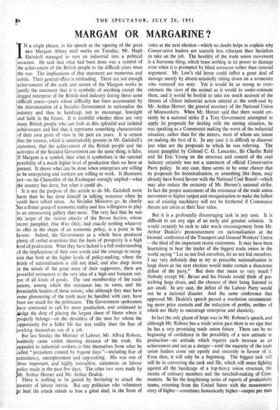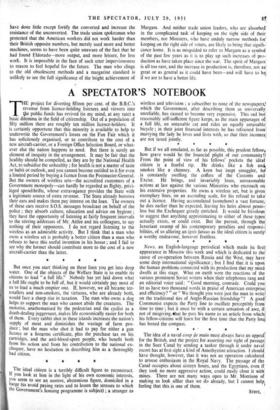MARGAM OR MARGARINE ?
IN a single phrase, in his speech at the opening of the great new Margam Abbey steel works on Tuesday, Mr. Hugh Gaitskell managed to turn an industrial into a political occasion. He said that what had been done was a symbol of the achievement of the British people in the difficult years since the war. The implications of that statement are numerous and subtle. Their general-effect is misleading. There are not enough achievements of the scale and nature of the Margam works to justify the statement that it is symbolic of anything except the dogged enterprise of the British steel industry during those same difficult years—years whose difficulty has been accentuated by the determination of a Socialist Government to nationalise the industry and thus to handicap, not to encourage, foresight and faith in the future. It is doubtful whether there are very many British people who can look at this splendid and isolated achievement and feel that it represents something characteristic of their own point of view in the past six years. It is certain that the nuance, which is unmistakably present in Mr. Gaitskell's statement, that the achievement of the British people and the activities of the Socialist Government are the same thing, is false. If Margam is a symbol, then what it symbolises is the rational possibility of a much higher level of production than we have at present. It shows what can be done when enterprises are willing to be enterprising and workers are willing to work. It illustrates not—as the Chancellor of the Exchequer wrongly implied—what the country has dose, but what it could do..
It is not the purpose of this article to do Mr. Gaitskell more harm than he has done himself is talking nonsense when he could have talked sense. As Socialist Ministers go, he clearly has a firmer grasp of economic reality and less willingness to play to an unreasoning gallery than most. The very fact that he was the target of the vicious attacks of the Bevan faction, whose recent pamphlet, One Way Only, had exactly nothing whatever to offer in the shape of an economic policy, is a point in his favour. Indeed, the Government as a whole have produced plenty of verbal assertions that the basis of prosperity is a high level of production. What they have lacked is a full understanding ;of the implications of their own words and the courage to recog- nise that both at the higher levels of policy-making, where the fetish of nationalisation is still not dead, and also deep down 1lin the minds of the great mass of - their supporters, there are werful resistances to the very idea of a high and buoyant ut of all kinds of goods. The vast membership of the trade unions, among which this resistance has its roots, and the Formidable leaders of those unions, who although they may have some glimmering of the truth must be handled with care, have been too much for the politicians. The Government spokesmen have continued to call for more production, and continued to dodge the duty of placing the largest share of blame where it properly belongs—on the shoulders of the men for whom the ,opportunity for a fuller life has less reality than the fear of `working themselves out of a job.
- But last Sunday the Minister of Labour, Mr. Alfred Robens, [suddenly came within shooting distance of the truth. He appealed to industrial workers to free themselves from what he called " prejudices created by bygone days "—including fear of redundancy, unemployment and rate-cutting. His was one of Ithree important, and highly instructive, statements on labour policy made in the past few days. The other two were made by Mr. Arthur Horner and Mr. Arthur Deakin.
There is nothing to be gained by hesitating to attack the monster of labour inertia. But any politician who volunteers 40 lead the attack stands to lose a great deal, in the form of votes at the next election—which no doubt helps to explain why Conservative leaders are scarcely less reluctant than Socialists to take on the job. The hostility of the trade union movement is a fearsome thing, which loses nothing in its-power to damage even when it is prompted by blind unreason rather than rational argument. Mr. Low's old horse could inflict a great deal of damage merely by absent-mindedly sitting down on a tormenter who venture3 too near. Yet it would be as wrong to over- estimate the vices of the animal as it would to under-estimate them, and it would be foolish to take too much account of the threats of violent industrial action uttered at the week-end by Mr. Arthur Homer, the general secretary of the National Union of Mineworkers. When Mr. Homer said that there would cer- tainly be a national strike if a Tory Government attempted to apply its proposals for dealing with the mining situation, he was speaking as a Communist making the worst of the industrial situation, rather than for the miners, most of whom are intent on making the best of it. In any case it is difficult to discover just what are the proposals to which be was referring. The recent pamphlet by Colonel C. G. Lancaster, Sir Charles Reid and Sir Eric Young on the structure and control of the coal industry certainly was not a statement of official Conservative Party policy. In any case, there seems to be some chanCe that its proposals for decentralisation, or something like them, may already have found favour with the National Coal Board—which may also reduce the certainty of Mr. Homer's national strike. In fact the proper assessment of the resistance of the trade union movement to higher output and reorganisation to make the fullest use of existing machinery will not be furthered if Communist threats are taken at their face value.
But it is a profoundly discouraging task in any case. It is difficult to see any sign of an early and genuine solution. It would certainly be rash to take much encouragement from Mr. Arthur Deakin's pronouncement on nationalisation at the biennial conferenceof the Transport and General Workers' Union —the third of the important recent statements. It may have been heartening to hear the leader of the biggest trade: union in the world saying " Let us not fool ourselves, let us not kid ourselves. I say very definitely that to try to prescribe nationalisation in large doses at the next election would make certain a disastrous defeat of the party." But does that mean so very much ? Nobody except Mr. Bevan and his friends would think of pre- scribing large doses, and the chances of their being listened to are small. In any case, the defeat of the Labour Party would not be a national disaster. And the same conference that approved Mr. Deakin's speech passed a resolution recommend- ing more price controls and the reduction of profits, neither of which are likely to encourage enterprise and elasticity.
In fact the only gleam of hope was in Mr. Robens's speech, and although Mr. Robens has a trade union past there is no sign that he has a very promising trade union future. There can be no beginning of confidence in the possibility of a new attitude to production—an attitude which regards each increase as an achievement and not ,as a danger—until the majority of the trade union leaders come out openly and sincerely in favour of it. Even then, it will only be a beginning. The biggest task will still lie in converting the rank and file, which will mean fighting against all the handicaps of a top-heavy union structure, the inertia of ordinary members and the mischief-making of Com- munists. So far the lengthening series of reports of productivity teams, returning from the United States with the monotonous story of higher—sometimes fantastically higher—output per man have done little except fortify the converted and increase the resistance of the unconverted. The trade union spokesman who protested that the American workers did not work harder than their British opposite numbers, but merely used more and better machines, seems to have been quite unaware of the fact that he had found Eldorado—more output, and more leisure, for less work. It is impossible in the face of such utter imperviousness to reason to feel hopeful for the future. The man who clings to the old obsolescent methods and a margarine standard is unlikely to see the full significance of the bright achievement of Margam. And neither trade union leaders, who are absorbed' in the complicated task of keeping on the right side of their members, nor Ministers, who have unduly narrow methods fort keeping on the right side of voters, are likely to bring that signiff-1 cance home. It is as misguided to refer to Margam as a symbol of the past few years as it is to play up such increases of pro-' duction as have taken place since the war. The spirit of Margam! is all too rare, and the increase in production is, therefore, not as great or as general as it could have been—and will have to be if we are to have a better life.



































 Previous page
Previous page